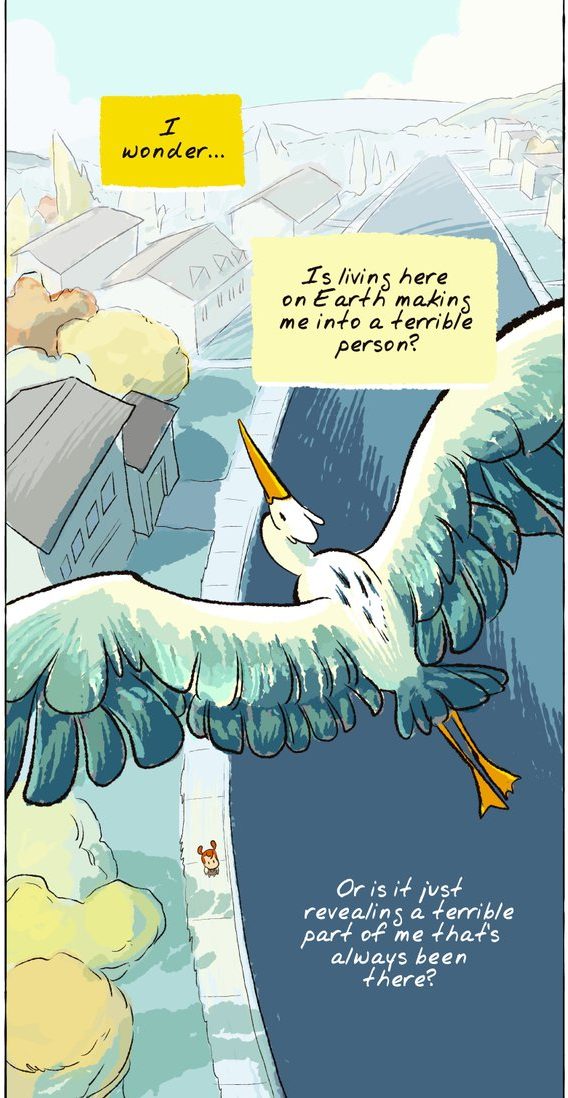Storytelling With Faith and Free Will
Fantasy novelist R. J. Anderson shares her conversation with author and artist Stephen McCranie.
 R.J. Anderson: Let’s start by talking about Space Boy. As I recall, you started drawing the comic for a contest back in 2014, and made it your goal to draw 100 pages in two months. Not only did you win a large, enthusiastic audience and the $30,000 grand prize, you’ve been posting a new chapter of the story every Thursday since. What have you learned from this project that’s worth sharing with other creatives?
R.J. Anderson: Let’s start by talking about Space Boy. As I recall, you started drawing the comic for a contest back in 2014, and made it your goal to draw 100 pages in two months. Not only did you win a large, enthusiastic audience and the $30,000 grand prize, you’ve been posting a new chapter of the story every Thursday since. What have you learned from this project that’s worth sharing with other creatives?
 Stephen McCranie: Working on Space Boy has basically inverted my entire approach to storytelling. I used to approach my comics like a screenwriter—I wouldn’t start drawing until I had finished the script and was certain I had a good book on my hands. I was like a story architect, building my stories using formulas and writing principles.
Stephen McCranie: Working on Space Boy has basically inverted my entire approach to storytelling. I used to approach my comics like a screenwriter—I wouldn’t start drawing until I had finished the script and was certain I had a good book on my hands. I was like a story architect, building my stories using formulas and writing principles.
Ironically, the more I studied story formulas, the more I came to dislike stories that I could tell were pressed from that kind of mold. And yet I couldn’t let go of my formulas because I was too scared of creating something that wouldn’t be popular.
R.J.: I’ve felt that anxiety myself. The more you read about the Hero’s Journey or Save The Cat or what-have-you, the harder it is to see your story as an organic whole and not just a collection of mechanical parts. I’m fascinated to know what techniques have worked for other writers because I’m always looking for ways to improve—but I have to be careful not to take them as gospel or they paralyze me.
Stephen: I remember seeing a documentary on how the animator Hayao Miyazaki creates his work, and I was shocked to learn that his studio begins work on his films before he knows the end of them. I couldn’t understand how such a process could be possible or sustainable—here in the US no studio would ever start work on a movie that didn’t have a completed script. And yet Miyazaki has created some of the most beautiful films I know of.

Space Boy, Stephen McCranie
Space Boy forced me to let go of my old, fear-based methods of creating work and it’s given me insights into how Miyazaki creates his stuff. I didn’t have time to write the whole story of Space Boy beforehand, so instead I relied on my instincts and my taste—and the results have been so much more natural, honest and true to life.
R.J.: I’ve noticed that. For a story set in the future that incorporates fantastic technology and some pretty dramatic plot twists, Space Boy has a relaxed pace and an attention to detail that makes it both relatable and realistic. It sounds like you’ve learned a lot about storytelling just from this project.
Stephen: Someday I want to write a book about what I’ve learned—I have so much to say—but the most profound connection I’ve made is how storytelling relates to the mystery of free will.
R.J.: Oh, that’s interesting! Can you elaborate?
Stephen: From what I read of the Bible, God is in control of all aspects of reality, all the movements of time and happenstance and humanity, and yet at the same time, we have the ability to make choices that have consequence and meaning. I think that the most honest stories are the ones that capture this mystery. The characters move and breathe and make choices, and yet they are being guided by the author.
To me, this is the essence of verisimilitude. Stories where the characters are pushed from plot point to plot point feel flat, because the author has failed to acknowledge the existence of free will. Conversely, stories where there is nothing at stake and no plot to follow are at best boring and at worst full of despair, because the author doesn’t acknowledge the existence of God’s sovereign hand guiding all things. But the stories that feel the most real are the ones where the characters act according to who they are and make choices that get them into situations where there seems to be no hope of rescue or salvation, but then meet God in those moments and align with his truth, and we as the audience are surprised to discover that everything in the story happened for a reason, and couldn’t have happened any other way.
 R.J.: Like Tolkien’s notion of eucatastrophe. I played with that concept at the end of my novel Ultraviolet, and it’s become one of the most frequently quoted things I’ve ever written. It really does resonate with people.
R.J.: Like Tolkien’s notion of eucatastrophe. I played with that concept at the end of my novel Ultraviolet, and it’s become one of the most frequently quoted things I’ve ever written. It really does resonate with people.
Stephen: In a way it encapsulates the whole outlining vs. free-writing debate—writing the story from the outside verses writing the story from the inside. But what really helped me was realizing that I am not the God of the worlds I create in my stories. If I insist on being the God of the worlds I create, then I am confined to making incredibly small stories. In reality, we don’t fully comprehend God or understand what he is doing all the time—so if we want to create stories that feel real, we need to let things happen that we don’t fully understand, because that’s how life is. If we want to make stories that resonate, we need to let God be the God of our stories.
This has changed a lot of things for me. At one point I caught myself praying for my characters, hoping that things would work out for them because I wasn’t sure. And yet by faith I understand that, both in my life and in my stories, God works all things for his glory and our good, and in the end, things will turn out okay.
R.J.: We feel more secure when we believe we’re in control, don’t we? It’s nerve-wracking to not be certain where you’re going next. And yet that’s life. That’s faith. It doesn’t mean not planning ahead at all — I’m sure you have ideas of what’s going to happen next for Amy, Oliver and the rest of the gang, and even specific scenes you’re looking forward to drawing. But it means being open to change and correction and redirection as you go along.
Yet if we’re respecting the free will of our characters and trying not to “play God” with our own stories, isn’t there a danger that we’ll end up with something that’s honest and believable but not as spiritually resonant as it could be? How do we as Christian storytellers stay faithful to our convictions and express our faith in a meaningful way, but also tell a legitimately good story that even those who don’t share our faith can appreciate?
Stephen: This is a great question. There’s a fantastic book called Speaking of Jesus by Carl Medearis, which I would recommend to any Christian creative who struggles with these pressures. In the book, Medearis questions the line we often draw between Christians and non-Christians, and points out that we as Christians have made the mistake of adopting an inside/outside mentality.
Don’t get me wrong, it’s important to be able to distinguish yourself and discern if someone shares your values. But more often than not I find that the Christian/non-Christian dichotomy does more harm than good. We build a wall between us and them, and as a result our only way of interracting with “outsiders” is in opposition to them.
R.J.: So instead of sharing the Good News we have with them as fellow image-bearers of God, it becomes a mentality of Setting Those Heathens Straight.
Stephen: Yes. And I don’t mean to accuse people—I think a lot of well-meaning Christians do this. But I believe we build these walls largely out of a misunderstanding of the basis of our faith.
 The problem lies in the fact that many Christians think that they receive their salvation by accepting a certain doctrine into their head, or praying a certain prayer—when in fact, our salvation lies not in a doctrine, but in a person named Jesus. Yes, there is a truth we must believe, but Jesus said, “I am the Truth.” Yes, there is a way we must go, but Jesus said, “I am the Way.”
The problem lies in the fact that many Christians think that they receive their salvation by accepting a certain doctrine into their head, or praying a certain prayer—when in fact, our salvation lies not in a doctrine, but in a person named Jesus. Yes, there is a truth we must believe, but Jesus said, “I am the Truth.” Yes, there is a way we must go, but Jesus said, “I am the Way.”
This reality should radically change how we interact with non-believers. If we believe that Christianity is something we know, then we have to approach people like salesmen—creating propaganda to sell our brand of truth. Furthermore, it puts us on a higher ground than other people. Rather than saying “I know something you don’t know, and if you were smarter you could come up to my high castle,” we should come beside people and say “There is no difference between you and me. I’m not any smarter than you are. But I know this guy—his name is Jesus and I want you to meet him!” This has been really helpful for me and given me a lot of freedom in my creative practice.
RJA: That’s an excellent point, the difference between telling people something and introducing them to someone. The question for me is, though, how do we reveal Jesus, specifically Jesus and not merely “God” in some nebulous sense, in our storytelling? Or is the revelation of Jesus Himself not something we can do well in a fictional context, and our focus should be on revealing some other aspect of God’s truth that might prepare people’s hearts for Him?
Stephen: This is a multidimensional question, so I’m going to give about four or five answers and hope that one is helpful.
First, there is a great freedom in knowing that God is the one who saves people. He doesn’t need our art to bring people to himself. He could use a rock, or a cloud or a forgotten memory from childhood. Our duty as writers and artists is simply being obedient to Jesus—and nothing more! In 1 John it says, “And this is [God’s] commandment, that we believe in the name of His Son, Jesus Christ, and love one another, just as He has commanded us.” This is all God asks, and it’s hard, don’t get me wrong. But the burden is so much lighter than trying to be our own God. Jesus’s yoke is light.
Seeing it this way is freeing, because it means if non-believers miss the Christian themes in our books, it’s okay. It just means God decided not to use our book in their lives. He has other plans for them because he loves them.
R.J.: That’s a good point. It’s not up to us to do the work of the Holy Spirit, but rather not to quench Him. If He gives us a story to tell, then He’ll use it as He sees fit, even if it goes right past most people. Maybe it only needs to reach one.
Stephen: Exactly! We are small and that’s a good thing.
R.J.: I think the fear comes in when we think it’s all up to us —we have to get the whole gospel in somehow, and we have to do it exactly right, or we’ve failed to honor God in our storytelling or reflect His truth to others. But Jesus’s parables, which are the closest thing to fiction we have in the New Testament, were often very limited in scope and open to interpretation. He used them to illustrate truth, challenge preconceptions, and raise questions in people’s minds, but not to teach doctrine. He used preaching for that.
Stephen: Yes. I have often felt a hunger to speak more directly about Jesus in my work, but it’s important to understand that the medium is as important as the message. This is a hard pill to swallow, since we have such a great message to share, but what we need to understand is that our tone and delivery affect how people take what we’re saying.
I recently went to a library conference and there was a guy who came to my table. He seemed genuinely excited about my work and asked me to explain my process and what my books were about—but then he turned the conversation to his own work and I realized his intention was just to promote himself. It was disappointing to learn he wasn’t really interested in me—he just wanted a chance to give me his sales pitch—or in other words—his message.
R.J.: We’ve all met people like that in one context or another. Nobody wants to be That Guy.
Stephen: When we write stories, we are not promising people a good message—we are promising entertainment. That’s why they buy our books. I’m not saying that we can’t have a message in our books—in fact I believe you can’t tell a story without revealing a worldview—but we must understand that sometimes our stories are not built to talk directly about Jesus.
There is however one practical way to talk about Jesus with our work, and that’s through interviews and fan interactions. I try to write books that get people to ask me the right questions so that I can have an excuse to tell them about Jesus. In Brick by Brick, which is all about creativity and doesn’t mention Jesus at all, I wrote an essay about the importance of not having art be your identity—and in an interview later someone asked, “Well, if your art can’t be the basis of your identity, what should be?” Similarly, in Space Boy, I ask a lot of existential questions about life—about whether truth exists or not. This has led to great conversations about Jesus.
R.J.: Is this in comments and e-mails from readers? Talking to people in person? Or both?
Stephen: Both, I’d say.
R.J.: That’s great to hear. And I really like that point about writing books that get people to ask you the right questions. Or at least to ask themselves those questions, even if you’re not the person who gets to answer them.
Stephen: Yeah—those are the kind of books that point to Jesus even if they don’t mention him.
R.J.: I think those are the kind of books we’d all like to write. Thanks, Stephen.
Stephen McCranie is the writer-illustrator of the Mal & Chad graphic novels for kids, the award-winning serial webcomic Space Boy, and a Kickstarter-funded book on creativity entitled Brick by Brick. He is also a committed Christian who loves to talk (and draw!) about living a spiritual, productive, and healthy creative life at doodlealley.com.





































Thank you both for an insightful and inspiring exchange.
Thank you for reading and commenting on it! <3
I loved this. So many interesting thoughts!
Ooooh – RJ Anderson likes Space Boy 🙂
I like the way both of you have Christian truth in stories that are not overtly ‘christian’.
“sometimes our stories are not built to talk directly about Jesus. There is however one practical way to talk about Jesus with our work, and that’s through interviews and fan interactions. I try to write books that get people to ask me the right questions so that I can have an excuse to tell them about Jesus.”
That reminds me a bit of Jesus’ parables, such as the Sower – he told the story to people in general, but only told the meaning to those who were interested/intrigued enough to ask.
This is amazing!!! Thank you so much for posting this interview!!!